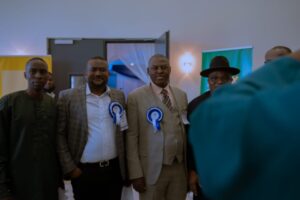Apr 18, 2023 | Blog, Press Release
Kenyon International CEO, Dr Victor Ekpenyong, delivered a thought-provoking contribution during the NIES2023 panel discussion on ‘Global Perspective for a Sustainable Energy Future’. His insightful comments emphasized the need for a human-centric approach to energy, comparing energy to democracy in that it should be for the people. However, he expressed concern that the policy-making process in Nigeria does not reflect this sentiment and recounted his own experience setting up an assembling plant and facing exorbitant energy bills.
Dr Ekpenyong stressed the importance of energy for business success in Nigeria and cautioned that the transition to renewable energy is premature without accessible and affordable energy. He highlighted the obsolete transmission lines that convey energy generated and the need for viable transmission lines and technologies to make energy more accessible and affordable for all citizens.
In conclusion, Dr Ekpenyong called on all stakeholders to adopt a human-centric approach to energy policy and ensure that energy is affordable and accessible to all Nigerians. Kenyon International remains committed to playing a pivotal role in advocating for an energy policy that benefits all Nigerians.
Apr 5, 2022 | Press Release, Well Integrity
The CEO of Kenyon International West Africa Company Limited, Victor Ekpenyong, at the just concluded Oloibiri Lecture Series and Energy Forum held on the 31st of March 2022, has proposed that deploying an idle well management strategy and remote well control are the two key solutions to combating oil theft which can equally maximise oil production to increase revenue and facilitate Nigeria’s energy transition.
The lecture which took place at PTDF Towers, CBD in Abuja was themed ‘Global Energy Transition: Implications on Future Investments in the Nigerian Oil and Gas Industry’ and attended by industry dignitaries.
In Victor Ekpenyong’s opening remark, he stated that oil theft has been the bane of our economy as it had led to loss of revenue and environmental pollution; and since oil accounts for the major source of revenue in Nigeria, it behooves the federal government to maximise its oil production through putting measures that deters oil theft and vandalism.
In his speech, he explained that an idle well management strategy will enable a well to be decommissioned safely to protect it from being vandalised and restore an abandoned well to full potential when necessary while remote well control is a technology that can be deployed to protect oilfields facilities and environment from hazards such as blowouts.
Victor Ekpenyong appealed to the federal government to integrate the idle well management strategy and remote well control to help reduce the number of emerging idle wells and boost oil production which can in turn help fund and facilitate a smooth transition into a clean energy.








